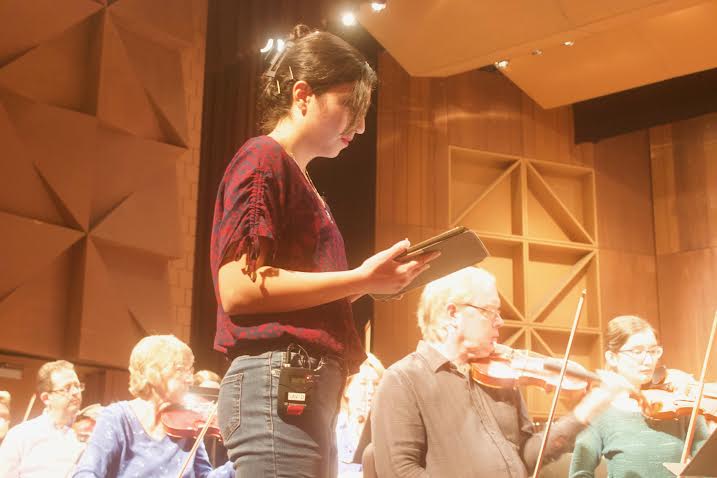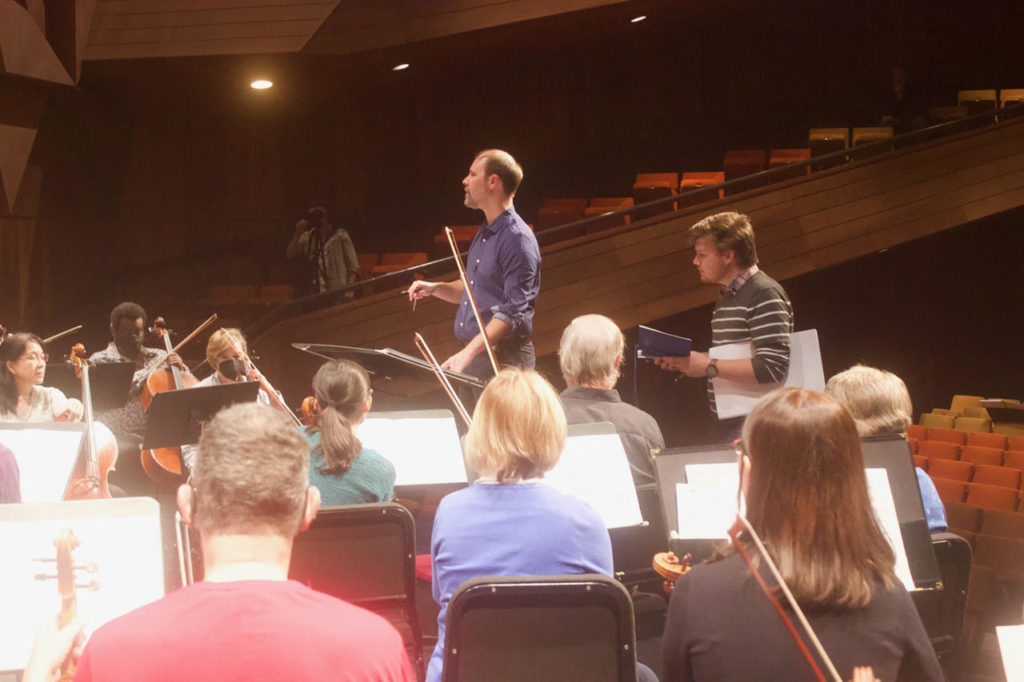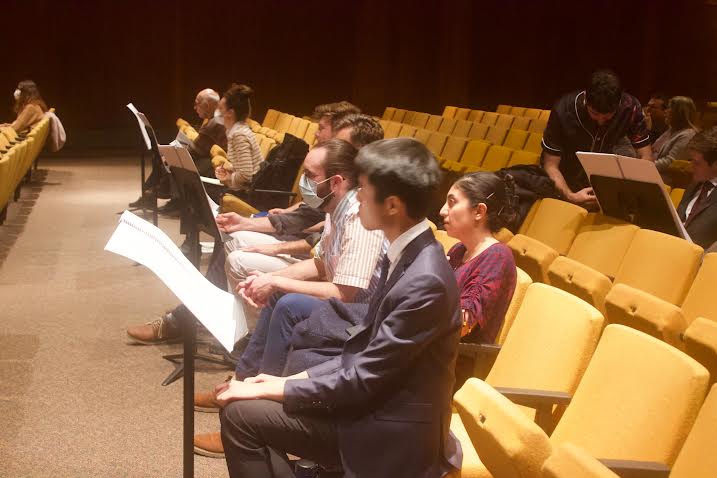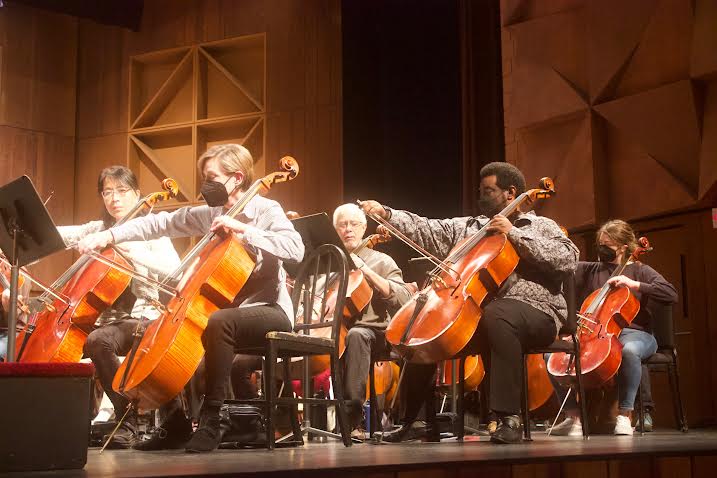By DAVID DUPONT
BG Independent News
Joseph Miller was in elementary school when he first heard a piece he had written played by an orchestra.
Composed for the Livonia Youth Orchestra, the piece “wasn’t very good,” he said on Wednesday.
A short while before, Miller, now a music student at the BGSU College of Musical Arts, heard another composition of his played by an orchestra. This time it was the Toledo Symphony Orchestra. “It was a phenomenal performance,” he said of the TSO’s reading of his “Alone at 7:03 and the Stillness of the Lake.”
Miller was one of five student composers, undergraduate and graduate, who had their works played by the TSO in the 10th Toledo Symphony Student Composer Reading Session.

Miller, Landon Cina, Matthew Lam, Shahzrad Talebi, and Eli Chambers all had compositions selected to be on the program.
The orchestra, conducted by Michael Lewanski of DePaul University, devoted 24 minutes to each piece, first reading the work through completely, then working a specific passages and hearing comments from the composer, and then again playing it all the way through.
The compositions were recorded for the students’ use.
Zosha di Castri, a New York-based composer from Canada, quipped that she was “a little jealous” of the young composers having the chance to hear their works played and recorded by a professional orchestra
Such an opportunity is rare, she said. “It’s really wonderful,” she said.
“I didn’t know they’d been doing it for so long,” di Castri said. “It really shows that this orchestra has had that experience. They seem fully on board and supportive helping these young composers achieve these new sounds.”
She said it was exciting “to hear the different voices emerging here.”
The Columbia University professor was scheduled to meet with the young composers later that evening to discuss their works.

Lewanski, who has conducted most of the reading sessions over the past decade, said each of the pieces was distinctive.
The reading session is not just another day at work for the symphony. Typically, when preparing a concert of new music, he said, the first rehearsals are horrible. Musicians get parts, without a score, and no recordings to reference. “It’s impossible to know what’s going to be difficult.”
In this case, they must “wrap their heads around” five different pieces, and there’s exhaustion that comes from concentrating on five unfamiliar compositions in such a short span of time.
“For the sake of the students it has to be reasonably good,” he said.
“The Toledo Symphony musicians do an amazing job,” Lewanski said. “I’ve worked with other professional groups that do not take student readings seriously. These musicians are always serious. … They’re great players, and they have such great attitudes. They take the learning aspect of it really seriously for the students.”
He added:“ A consistent strength of this program is how meticulously prepared the scores and parts are. The composition faculty does an amazing job.”
He’s seen far messier scores and parts from established composers.
Copies of those scores are set on music stands throughout Kobacker Hall, so listeners can follow along.

Composer Christopher Dietz, the coordinator of the event, urged the students in attendance to follow along on the scores. That’s an important part of the event. He cautioned them to turn the pages quietly so the sound of a dozen or so pages being turned at the same time isn’t picked up on the recording.
Dietz founded the event with a financial contribution from music booster Karol Spencer.
The students’ compositions grow out of a range of experiences – global and deeply personal.
Matthew Lam said his piece “Our War” reflects both his experience of the protests in his hometown of Hong Kong as well as the war in Ukraine. “I felt it would be good to write a piece that responded to all that’s happening in the world.”
The culminating sections were extremely loud with the forte signs piled on. The resulting sound, he said, proved more effective than he imagined.
Eli Chambers’ “a vagrant thought” has personal origins. He meditates as therapy to treat his ADHD. “The piece follows a hypothetical me trying to ignore all of those intrusive thoughts while I’m focusing myself. You don’t refute them. You acknowledge them. You just try to let them pass through you and move on.”
Chambers explores this in subtle nuances, a contrast to the blare of Lam’s piece. Some string textures were meant to be almost inaudible, he said. But they projected better than he expected. “It gives this bed of white noise to everything that’s happening. It’s pretty remarkable texture, and they pulled it off expertly.”
Landon Cina employed microtones in his piece. These are the notes in the cracks of the standard 12 notes of the chromatic scale He was pleased by the musicians precise rendering of them. “It doesn’t come naturally,” he said.
Cina did not start with a program in mind. Rather he lays out his musical materials, and lets the piece take shape.
The inspiration for Shahrzad Taledi’s “Meet me where the light leaks” came from a dream. “It was a very dark place, and the only thing I could follow was the sound,” she said.
She followed that sound through the composing process, incorporating texture, floating meter, and loops of sound to capture her vision.
Shahrzad is a native of Tehran, Iran, who came to BGSU two years ago drawn by the College of Musical Arts’ reputation as “an awesome place for contemporary music” and the quality of the composition faculty’s work.
She played Iranian percussion instruments before starting to compose at 18 while studying in Tehran. At first, she wanted to do film scores, but became entranced by the sound of contemporary concert music.
Miller said the roots of composing for him go back to when he was in kindergarten and starting piano lessons. “I really hated the piano books,” Miller said. “This sounds bad,” he thought. So, he changed to the notes to what he thought sounded better. “I was composing different stuff from what my teacher wanted me to be playing.”
His composition “Alone at 7:03” is a long way from that child’s play. It was inspired by camping on Lake Michigan in the Leelanau State Park. Miller originally wrote a poem about the experience, and then used the poem as the guide for the composition.
“I always kind of knew the trajectory of the piece because it follows the trajectory of the poem,” he said. “Everything just clicks into place as I write it.”

